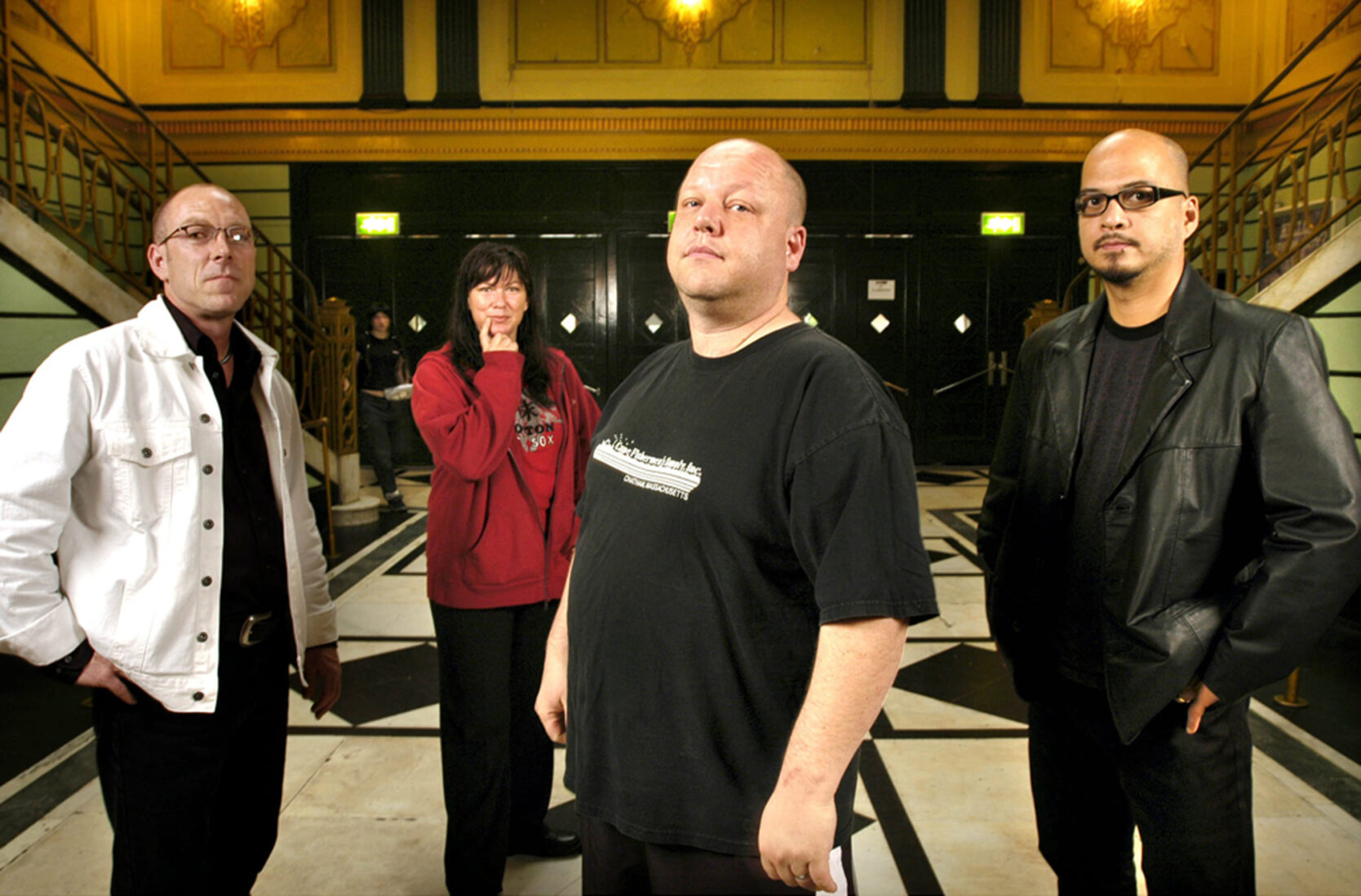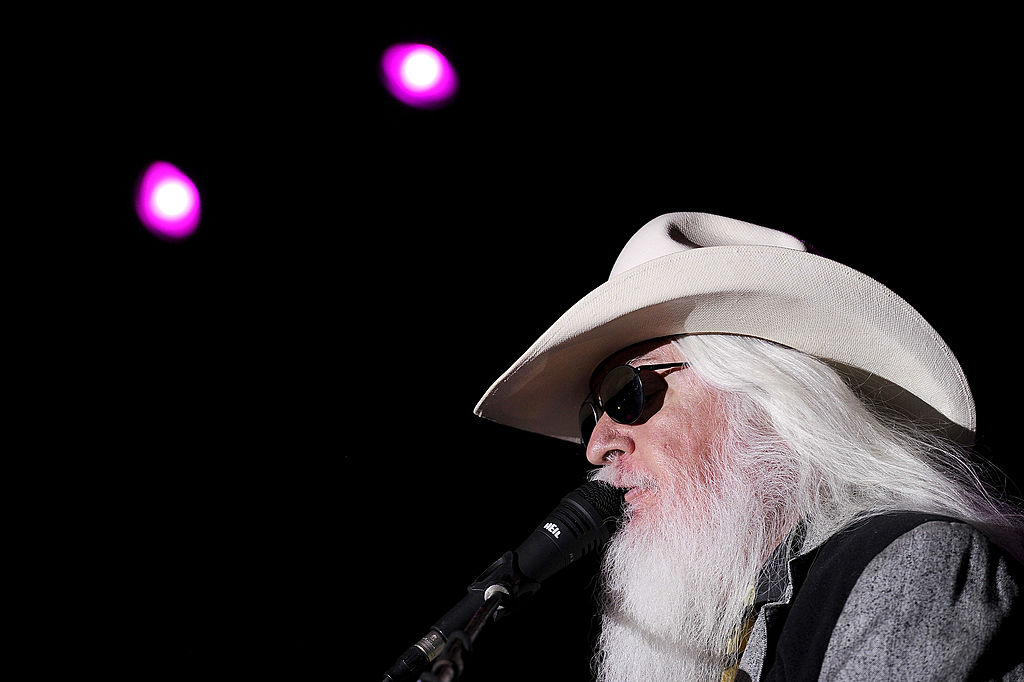As with all extraordinary natural occurrences, a must-own live album is a rare once-in-a-lifetime event.
Against all odds—or, perhaps because of them—Pixies have achieved the epic, rarified feat of producing a live experience that you simply must add to your collection. Live In Brixton (out February 25) documents their four sold-out reunion shows at London’s historic Brixton Academy in June 2004.
I spoke with guitarist Joey Santiago and drummer Dave Lovering about those legendary shows 18 years ago.
“That is one of our favorite venues to play, Brixton,” Joey says. “Not to dis Omaha or anything, but it’s almost like when we go there, ‘Shit, this is home.’ First of all, London is our second home because our label was there, and just going to Brixton now is a special feeling. You enter it and the backstage is still like almost a clubby feel. It’s an old building, and then you go down and then the roar of the crowd and then you’re just, you know, they’re loud! It’s always magic to us. Brixton always brings out the best in us,” Joey says. “It’s one of those few venues in the world that does that to us.”
“The secret of our success is humbleness,” Dave says.
“Speaking for myself, I don’t see why people go gaga over this shit,” Joey says, describing the array of celebs, including “Harry Potter”, who showed up to see them play London.
“I’d say we’re the top three humblest bands in the world,” Dave continues. When pressed, he adds: “Okay, the best.”
There are three versions of the box set. The vinyl standard version includes four heavyweight discs, with each show split between translucent colored LPs (June 2nd is red, June 3rd is orange, June 5th is green, and June 6th is blue). The vinyl indies exclusive version is pressed on clear vinyl with color splatters and, like the standard version, is being produced in a very limited run. The eight-CD box set follows the same color design as the vinyl standard version. All versions are beautifully packaged and include a collector’s booklet and fold-out poster.
The track that kicks it all off is a cover of Neil Young’s “Winterlong.” Other covers include Peter Ivers’ “In Heaven” (from the David Lynch film Eraserhead) and The Jesus and Mary Chain’s “Head On”. Amazingly, each setlist for each night is so incredibly different, covering (almost) everything, from hits to fan favorites. “Each night was different,” Dave explains. “We had such a catalog.”
“You’ll hear that Brixton time, you’ll hear like four people there being very excited. I think hopefully people feel that, could feel what we felt like,” Joey says.
When asked what he felt, he responds: “Nervous as shit.”
Live In Brixton offers a no-fail model for creating the ultimate live album. Start by forming a twosome in college (one of you must be newly out of academic probation), hire a bass player who doesn’t actually play bass yet, and pull a tech-wiz drummer out of a new job to form one of the most influential alt-rock bands of its time. After you’ve built a die-hard fan base and official, infallible influence in your genre—break up. Then, after eleven years have passed, reunite and make a killer live album. It’s as easy and improbable as that.
“I think the word just got out and the inklings were all in people’s heads, and it just came to fruition,” Joey said. “That was it. It was an itch, and everyone wanted to do it. Charles made a joke on some big radio station. It might have been the BBC. He said, ‘Yes, sure, we’ll get back together.’ All of a sudden, it blew up to being real.”
“The demand’s always been there, and that was it,” Dave says, adding, “Yes, it was something that I absolutely loved and I missed.”
When I spoke with Joey and Dave last year about Trompe le Monde turning 30, a focus was the tumultuous process that forecast an inevitable split. “We were assholes, we didn’t know what we had, and we fucking just called it quits,” Joey says. “Everybody was unhappy. Hey, it happens to bands though. It’s not new.”
Still, getting back together wasn’t something they took lightly. “We didn’t know how it was going to be. Honestly, we didn’t know how we were going to get along. I’m just speaking now for Kim’s behalf, that’s what she was more concerned about and then we had fun,” Joey says, referring to former bassist Kim Deal.
True to form, the band kept it all perfectly imperfect. Dave’s opening performance with his experimental magic show, The Scientific Phenomenalist featured a big trick that went completely awry. Joey’s Les Paul broke during his “Vamos” solo.
“The funny part about that was when it broke, the thing kept feedbacking and I felt like I was lip-syncing,” Joey recalls. “That’s when I had the idea to put the guitar on a stand after that. I go, ‘Fuck it, I don’t even need to touch this thing.’ After that, I felt that Simpson character, the little Simpson on SNL, like, ‘Fuck— The neck’s broken and the thing’s still playing. It’s like, ‘This is silly.’”
And then there was that time they all just left Dave still playing on stage. “I just kept playing ‘I’m Amazed’, I think, that’s the name of the song. I just kept going and going. I just kept going and going on and even when the band stopped,” Dave chuckles. “It was one of these nights. That wasn’t a good night for me if I recall.”
“We left the stage,” Joey says, plainly.
When asked what they’ve learned, from all they’ve been through, Joey responds “just to be more just grateful. We’re just giving the people what they want. You know what I mean? At the end of the day, it’s not really us. I told Charles [Black Francis] that the only time we get to be the boss is in the studio and we’re not the boss when we’re playing live. Who is the boss usually? It’s the people that pay you. They’re the ones paying, and we’re the ones that got to entertain them.” He pauses, then adds, “We’re paying for the fucking studio, so fuck everyone else.”
“Yes, I think it’s definitely gratitude and appreciation, and especially with COVID, the absence of working and doing this, it’s just you really realize how fond, fragile, working is and doing this, so you have to appreciate it more,” Dave says. “I think we’re still shocked when it sells out.”
“I’m wishy-washy,” Joey says. “We’re more disappointed when it doesn’t sell out.”
“I think the Brixton album was an encapsulated topic, and encapsulated its time too. I think it was very special and it’s still ongoing, but it was nuts having been afforded the opportunity to do those multiple nights, which is great for a band too, because you set up, you don’t have to do a soundcheck the next day or the next day or the next day, you just show up at whatever time. It was a real going to work, having fun kind of time,” Dave says.
“For me, I’m hoping that it’s one of those live albums where it’ll be like one of the great live albums out there, Cheap Trick at Budokan, The Kinks live [Live At Kelvin Hall]…J. Geils Band in Boston, their live album was better than their studio records. There’s only a few good live albums out there, right?” Joey says. “David, can you think of good live albums?”
“No, it’s true, I usually don’t like them,” says Dave. “It’s very, very few that I would buy one.”
“Hopefully, this is one of them,” Joey says.





